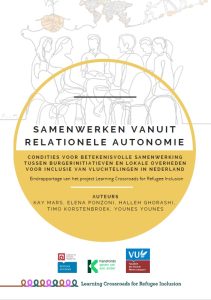“A wave of solidarity,” was how the great rise of new initiatives that emerged since 2015 in the Netherlands and in many other European countries around the reception and inclusion of refugees in society was described. While media reports were often dominated by fear and negative reactions, from governments and institutions there was often a reluctance to act and delayed action in the reception of refugees, at the same time, a new kind of civic initiative emerged all over Europe that tried to offer a welcome to refugees outside of established government programs and formal reception services. In the research project Learning Crossroads for Refugee Inclusion, we mapped the Dutch field of civic initiatives around refugees and investigated the meaning of this field for newcomers, also in relation to formal institutions. We published the findings of the project in the final report “Working Together from relational autonomy: conditions for meaningful cooperation between civic initiatives and local governments for Inclusion of Refugees in the Netherlands.” The full report can be downloaded here. Below is a brief summary of the main research findings.
A wave of solidarity
The research shows that the wave of solidarity from society has raised interesting but above all challenging issues. Among municipalities and civic initiatives, we find that there is great interest and commitment to work towards a Netherlands that is more inclusive for refugees and newcomers. Moreover, the current reception crisis has made the need for cooperation between different actors in society in relation to the inclusion of refugees and newcomers more visible than ever.
The research has shown that there are particularly many opportunities that are now often left unfulfilled because there is not enough awareness about the complementary value of civic initiatives and the perspectives of refugees in making policies around reception and integration more inclusive.
The project’s final report describes four thematic focal points that connect challenges surrounding collaborations between municipalities and civic initiatives with the opportunities these collaborations offer. The core argument here is that the synergy between municipalities and citizens’ initiatives must counterbalance dominant frames of mind regarding reception and inclusion of refugees in the Netherlands. When civic initiatives have to conform too much to the formal system, this potential threatens to come under pressure. Therefore, formal institutions that want to collaborate with informal organizations should make more room for what does not fit within the formal system.
Policy and organizational structures must be put in place that enable the inclusion of refugee-led initiatives.
The role of refugee-led civic initiatives
The report also calls for specific attention to the role of refugee-led civic initiatives in collaboration between municipalities and (other) civic initiatives. Personal, lived knowledge and experiences combined with refugee advocates’ own civic engagement are crucial for designing inclusive structures and policies. These initiatives can help other actors in the field become aware of invisible structures of exclusion that refugees face.
At the same time, this research shows that the inclusion of refugee-led civic initiatives is often hampered by the existing rules and routines of municipalities. The current frameworks from which municipalities think and operate often do not allow or make it difficult to recognize the knowledge and expertise of citizen initiatives. Therefore, to actually include refugee-led initiatives in policy development and implementation, more is needed than just the goodwill of (often individual) municipal officials: policy and organizational structures must be set up that enable the inclusion of refugee-led initiatives.
Switched connections
In addition, the report describes the importance of recognizing complementary values in switched connections. Especially when more established civic initiatives may unknowingly become increasingly conformed to the formal system, it is important that they remain connected to civic initiatives that are less established and less connected to the formal system. At the same time, the less-established civic initiatives need the other civic initiatives to help them strengthen their own position.
Intermediate thinking requires reflection and challenging one’s own assumptions and assumptions.
In-between of spaces
For a sustainable and resilient shelter and inclusion system, language is crucial. In addition to a convergent language where we look for common leads and connections for understanding, it is also important to look at opportunities for a more divergent language. Here, it is important to look at allowing for different perspectives in determining what is needed for the inclusion of refugees and newcomers. In this way, a divergent language makes it possible to move beyond the current dominance of a market-oriented language.
To understand the value of these languages, we drew inspiration from the idea of intermediate thinking as an alternative to dominant, monolingual norm thinking. This intermediate thinking requires reflecting and challenging one’s own assumptions and assumptions. Creating safe in-between spaces where the stories and perspectives of in-betweeners can feed inspiration and imagination is a hopeful next step in the joint effort of civic initiatives, municipalities and other organizations to make Dutch society a more inclusive environment for refugees and newcomers.

